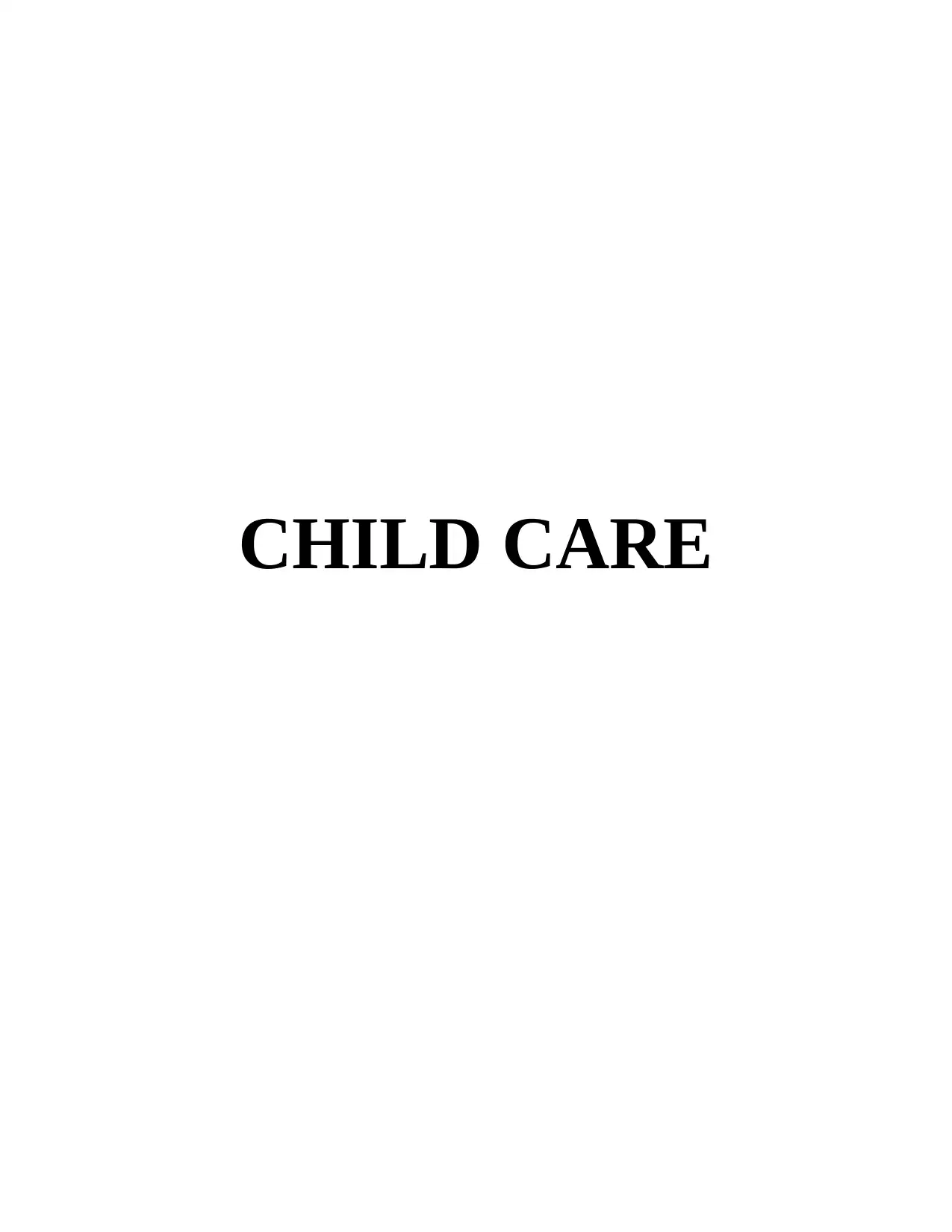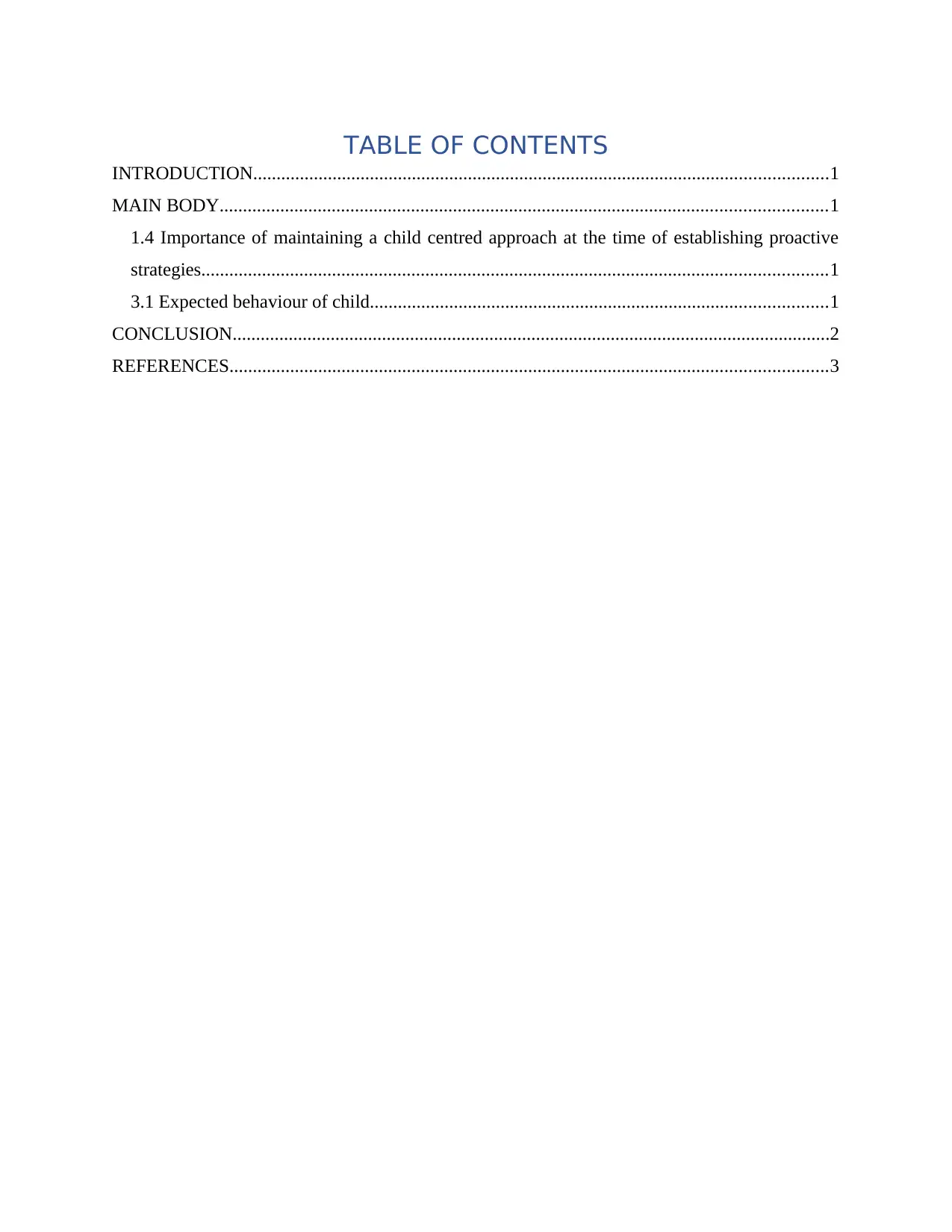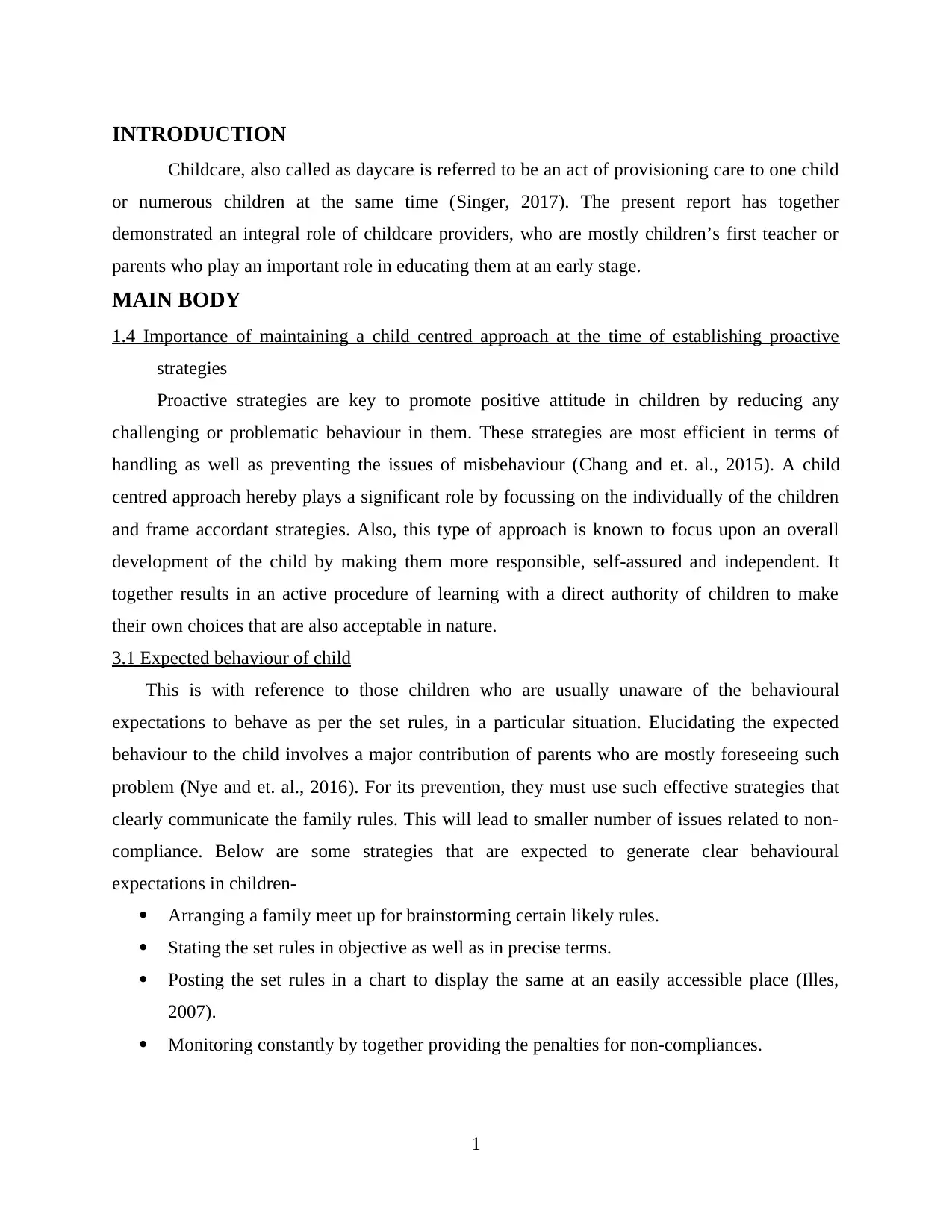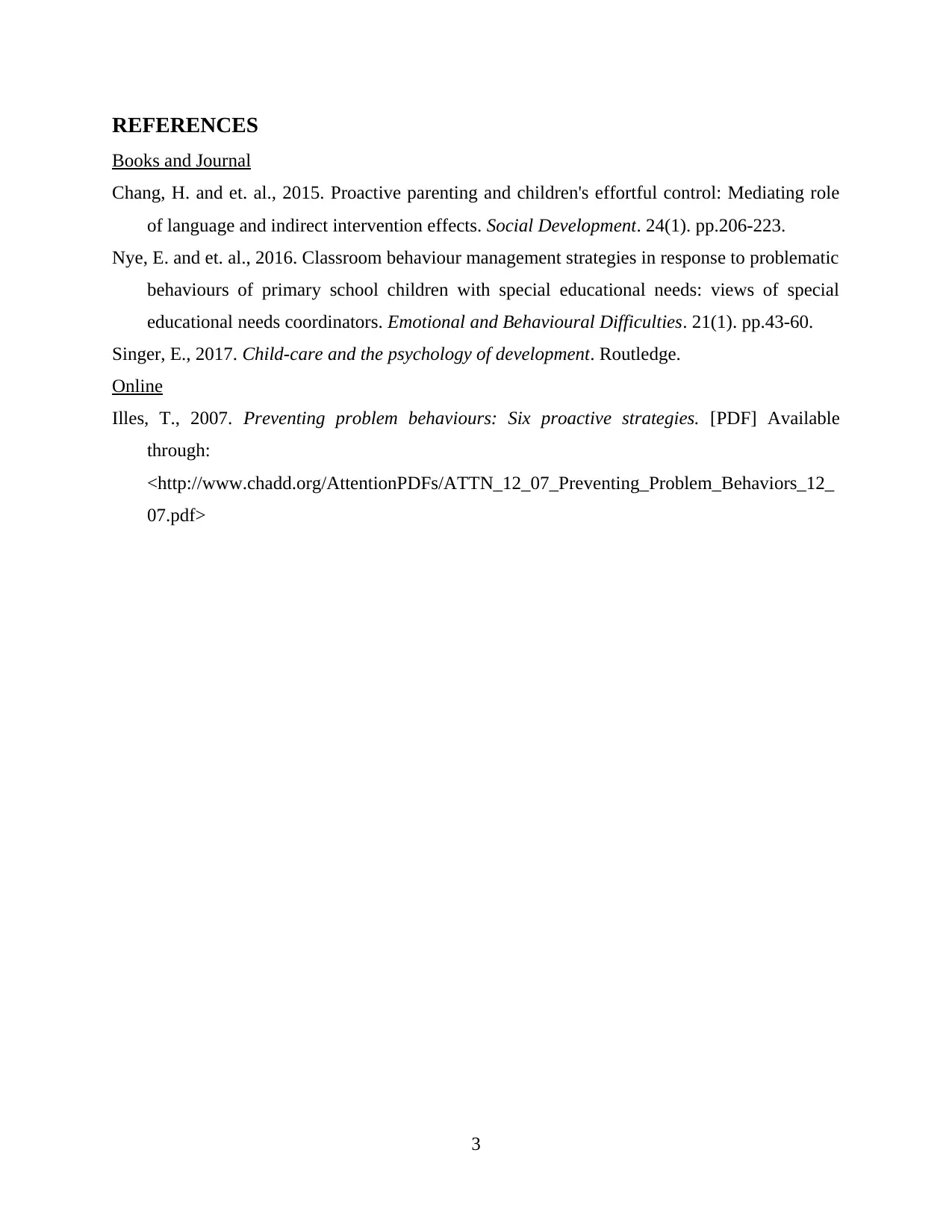Importance of Child-Centered Approach in Childcare
VerifiedAdded on 2020/10/22
|6
|590
|109
AI Summary
The assignment discusses the significance of maintaining a child-centered approach at the time of establishing proactive strategies in childcare. It examines the role of proactive parenting in reducing challenging or problematic behavior in children and highlights strategies such as setting clear behavioral expectations, using effective communication techniques, and monitoring constantly to prevent non-compliance. The document also references research studies and online resources that support these findings.
Contribute Materials
Your contribution can guide someone’s learning journey. Share your
documents today.

CHILD CARE
Secure Best Marks with AI Grader
Need help grading? Try our AI Grader for instant feedback on your assignments.

TABLE OF CONTENTS
INTRODUCTION...........................................................................................................................1
MAIN BODY..................................................................................................................................1
1.4 Importance of maintaining a child centred approach at the time of establishing proactive
strategies......................................................................................................................................1
3.1 Expected behaviour of child..................................................................................................1
CONCLUSION................................................................................................................................2
REFERENCES................................................................................................................................3
INTRODUCTION...........................................................................................................................1
MAIN BODY..................................................................................................................................1
1.4 Importance of maintaining a child centred approach at the time of establishing proactive
strategies......................................................................................................................................1
3.1 Expected behaviour of child..................................................................................................1
CONCLUSION................................................................................................................................2
REFERENCES................................................................................................................................3

INTRODUCTION
Childcare, also called as daycare is referred to be an act of provisioning care to one child
or numerous children at the same time (Singer, 2017). The present report has together
demonstrated an integral role of childcare providers, who are mostly children’s first teacher or
parents who play an important role in educating them at an early stage.
MAIN BODY
1.4 Importance of maintaining a child centred approach at the time of establishing proactive
strategies
Proactive strategies are key to promote positive attitude in children by reducing any
challenging or problematic behaviour in them. These strategies are most efficient in terms of
handling as well as preventing the issues of misbehaviour (Chang and et. al., 2015). A child
centred approach hereby plays a significant role by focussing on the individually of the children
and frame accordant strategies. Also, this type of approach is known to focus upon an overall
development of the child by making them more responsible, self-assured and independent. It
together results in an active procedure of learning with a direct authority of children to make
their own choices that are also acceptable in nature.
3.1 Expected behaviour of child
This is with reference to those children who are usually unaware of the behavioural
expectations to behave as per the set rules, in a particular situation. Elucidating the expected
behaviour to the child involves a major contribution of parents who are mostly foreseeing such
problem (Nye and et. al., 2016). For its prevention, they must use such effective strategies that
clearly communicate the family rules. This will lead to smaller number of issues related to non-
compliance. Below are some strategies that are expected to generate clear behavioural
expectations in children-
Arranging a family meet up for brainstorming certain likely rules.
Stating the set rules in objective as well as in precise terms.
Posting the set rules in a chart to display the same at an easily accessible place (Illes,
2007).
Monitoring constantly by together providing the penalties for non-compliances.
1
Childcare, also called as daycare is referred to be an act of provisioning care to one child
or numerous children at the same time (Singer, 2017). The present report has together
demonstrated an integral role of childcare providers, who are mostly children’s first teacher or
parents who play an important role in educating them at an early stage.
MAIN BODY
1.4 Importance of maintaining a child centred approach at the time of establishing proactive
strategies
Proactive strategies are key to promote positive attitude in children by reducing any
challenging or problematic behaviour in them. These strategies are most efficient in terms of
handling as well as preventing the issues of misbehaviour (Chang and et. al., 2015). A child
centred approach hereby plays a significant role by focussing on the individually of the children
and frame accordant strategies. Also, this type of approach is known to focus upon an overall
development of the child by making them more responsible, self-assured and independent. It
together results in an active procedure of learning with a direct authority of children to make
their own choices that are also acceptable in nature.
3.1 Expected behaviour of child
This is with reference to those children who are usually unaware of the behavioural
expectations to behave as per the set rules, in a particular situation. Elucidating the expected
behaviour to the child involves a major contribution of parents who are mostly foreseeing such
problem (Nye and et. al., 2016). For its prevention, they must use such effective strategies that
clearly communicate the family rules. This will lead to smaller number of issues related to non-
compliance. Below are some strategies that are expected to generate clear behavioural
expectations in children-
Arranging a family meet up for brainstorming certain likely rules.
Stating the set rules in objective as well as in precise terms.
Posting the set rules in a chart to display the same at an easily accessible place (Illes,
2007).
Monitoring constantly by together providing the penalties for non-compliances.
1

CONCLUSION
The current report has highlighted the formation of certain important strategies with
assistance of child centered approach. It is with a special context of children exhibiting several
behavioral difficulties and has thereby explicated the way in which a such child must be
enlightened to behave.
2
The current report has highlighted the formation of certain important strategies with
assistance of child centered approach. It is with a special context of children exhibiting several
behavioral difficulties and has thereby explicated the way in which a such child must be
enlightened to behave.
2
Secure Best Marks with AI Grader
Need help grading? Try our AI Grader for instant feedback on your assignments.

REFERENCES
Books and Journal
Chang, H. and et. al., 2015. Proactive parenting and children's effortful control: Mediating role
of language and indirect intervention effects. Social Development. 24(1). pp.206-223.
Nye, E. and et. al., 2016. Classroom behaviour management strategies in response to problematic
behaviours of primary school children with special educational needs: views of special
educational needs coordinators. Emotional and Behavioural Difficulties. 21(1). pp.43-60.
Singer, E., 2017. Child-care and the psychology of development. Routledge.
Online
Illes, T., 2007. Preventing problem behaviours: Six proactive strategies. [PDF] Available
through:
<http://www.chadd.org/AttentionPDFs/ATTN_12_07_Preventing_Problem_Behaviors_12_
07.pdf>
3
Books and Journal
Chang, H. and et. al., 2015. Proactive parenting and children's effortful control: Mediating role
of language and indirect intervention effects. Social Development. 24(1). pp.206-223.
Nye, E. and et. al., 2016. Classroom behaviour management strategies in response to problematic
behaviours of primary school children with special educational needs: views of special
educational needs coordinators. Emotional and Behavioural Difficulties. 21(1). pp.43-60.
Singer, E., 2017. Child-care and the psychology of development. Routledge.
Online
Illes, T., 2007. Preventing problem behaviours: Six proactive strategies. [PDF] Available
through:
<http://www.chadd.org/AttentionPDFs/ATTN_12_07_Preventing_Problem_Behaviors_12_
07.pdf>
3

4
1 out of 6
Your All-in-One AI-Powered Toolkit for Academic Success.
+13062052269
info@desklib.com
Available 24*7 on WhatsApp / Email
![[object Object]](/_next/static/media/star-bottom.7253800d.svg)
Unlock your academic potential
© 2024 | Zucol Services PVT LTD | All rights reserved.